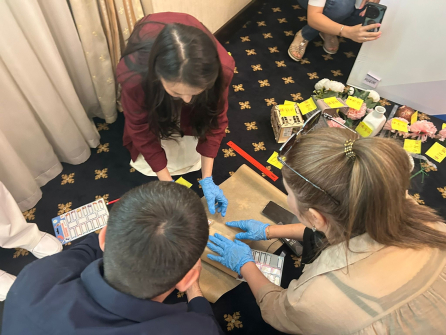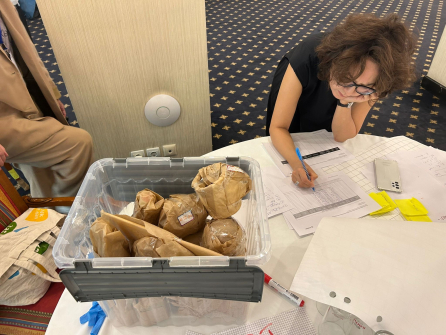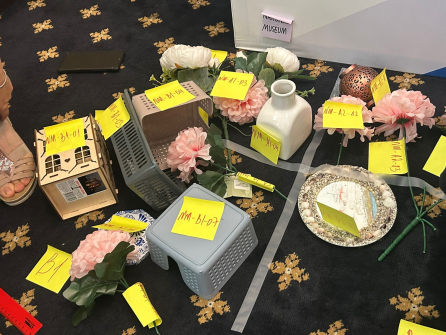From 25 to 29 August 2025, 34 professionals from Kazakhstan, Kyrgyzstan, Tajikistan, Uzbekistan and Turkmenistan gathered in Almaty, Kazakhstan, for a regional training on strengthening disaster risk reduction and emergency preparedness for culture. Jointly organized by UNESCO Almaty and ICCROM through its flagship First Aid and Resilience for Cultural Heritage in Times of Crisis (FAR) Programme, the course brought together participants from ministries of culture, museums, libraries, archives, restoration laboratories and local cultural departments.
Opening the course, representatives from ICCROM and UNESCO underscored the urgency of strengthening heritage protection in Central Asia, a region highly exposed to earthquakes, floods, fires and extreme weather events. In recent decades, such hazards have affected millions of people, caused billions in economic losses, and placed both communities and their cultural heritage at high risk. In response, this regional course was designed to equip professionals with the knowledge and skills to reduce risks, safeguard cultural heritage, and strengthen preparedness across the region.
Building on ICCROM-FAR’s field-tested tools and methodologies, together with UNESCO’s standard-setting frameworks, the five-day training combined lectures, hands-on exercises, and scenario-based tabletop simulations, to build essential skills for safeguarding heritage before, during and after emergencies. Designed and led by the ICCROM-FAR team, the course drew on extensive experience in heritage first aid and risk preparedness.
In a guided hands-on field exercise at the Museum of Folk Musical Instruments named after Ykhalas, participants conducted a comprehensive on-site risk assessment. They identified hazards and exposure, assessed vulnerabilities and capacities, and analyzed potential impacts of disasters such as earthquakes, fires, and floods. Participants were then introduced to ICCROM’s contextualized Vulnerability and Capacity Assessment (VCA) form, specifically designed for movable and intangible heritage, which they aim to apply within their own institutions after the training.
Using simple but effective tools developed by ICCROM, participants learned how to design risk mitigation measures and test structural models. They further deepened their skills in damage and risk assessment, a core step of ICCROM’s ISO-standard and codified First Aid to Cultural Heritage in Times of Crisis methodology. Through a practical tabletop exercise, they worked with contextualized forms developed specifically for the training, documenting different types of damage, analyzing risks, and classifying levels of impact on collections and sites.
They carried out practical exercises in emergency documentation, salvage and evacuation, strengthening their ability to apply first aid to heritage in crisis situations.
The course addressed disaster risk management for living heritage, underscoring the role of communities in resilience, while online sessions brought international expertise on tackling illicit trafficking of cultural property and managing fire risks for cultural and natural heritage. The programme culminated in a complex tabletop simulation exercise that tested participants’ ability to respond to cascading disaster impacts, coordinate across sectors, and make rapid, risk-informed decisions.
ICCROM distributed its field-tested tools, providing participants with practical resources to guide their work. These included the First Aid to Cultural Heritage in Times of Crisis Handbook and Toolkit, Endangered Heritage: Emergency Evacuation of Heritage Collections guidelines, PATH – Peacebuilding Assessment Tool for Heritage Recovery and Rehabilitation, the Community-Based Heritage Indicators for Peace, and inSIGHT, a participatory game that strengthens disaster risk governance.
As FAR’s first engagement in Central Asia, the introduction of these tools marks the beginning of a long-term effort to build regional capacity for risk reduction and emergency preparedness for cultural heritage.
Participants concluded the training by developing action plans for next steps, aimed at strengthening institutional emergency procedures, enhancing regional cooperation, and cascading knowledge within their organizations and communities.



